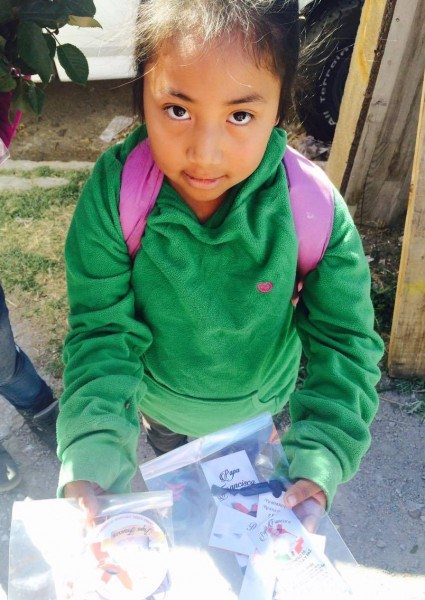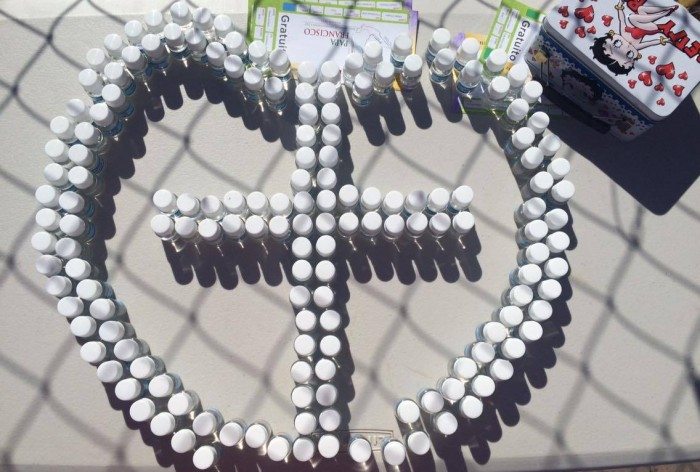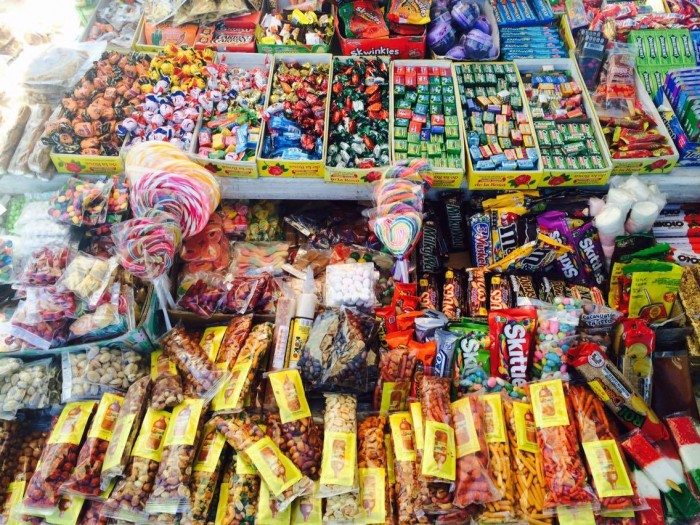

Natalia Velazquez holds a small packet with pope memorabilia. (Maria Esquinca)
Thousands of people flooded the streets of Juárez to see Pope Francis on Wednesday. Tickets were given out for free by the Diócesis de Ciudad Juárez so people could attend the Holy Mass. The Roman Catholic Diocese of El Paso was given 10,000 tickets, and the Roman Catholic Diocese of Las Cruces was given another 5,000 tickets. El Pasoans could also watch the Pope’s visit televised live from the Sun Bowl at the University of Texas at El Paso for $15.
By 8 a.m. thousands of people had already formed long lines outside the fairground entrance, or “El Punto,” where the Mass was held at 4 p.m. Intertwined between the flocks of people were soldiers, as well as federal and municipal police officers. Soldiers stood beside their military hummers and directed the masses, while cops patrolled the streets. They stood out with their green and dark navy-blue uniforms.
Although no official figures have been released, officials estimate over 300,000 people attended the mass in Juárez. While several hundred thousands of people had the privilege of watching the Pope’s visit, others didn’t.
Marissa Velazquez says she would have liked to attend the Mass, “but I have to work.” She is surrounded by buckets of flowers that contain roses, gerberas, lilies and margaritas. Their bright, colorful petals spill out of the edges of the buckets. She sells them for 20 pesos, or $1.09. She also sells little packets that contain a bookmark, magnet, keychain and button with the Pope’s image for 50 pesos, or $2.74. It took Marissa an hour to assemble the 70 packets. “They’re all inside my backpack,” Marissa’s 7-year-old daughter Natalia says.
During the pope’s visit to the Colegio de Bachillares del Estado de Chihuaha, where businessmen and workers spoke with Pope Francis, he said the best investment that can be made is in creating opportunities. “One of the greatest afflictions young people are exposed to is lack of opportunities to obtain an education and sustainable employment,” he said. “This generates in many, many cases situations of poverty and marginalization.”
Marissa’s puesto, or makeshift selling post, is one of more than 30 along David Herrera Jordan Avenue, intersecting Costa Rica and Bolivia Streets. The people behind the puestos sell a plethora of products — chips, roses, burritos, juice, t-shirts, coffee, grilled burgers, churros, etc. While most puestos consist of a small table to display products, some people sell food from the trunks of their cars, or the front of their houses. They advertise their merchandise through handwritten bright neon posters, and clamor to the people passing by.


A heart and cross made from small, holy water bottles atop a puesto (Maria Esquinca)
On the corner of Costa Rica Street, Marta Lopez, 73 years old, sells papas locas (crazy chips), popcorn and tostadas. Prices vary from 20 pesos to 10 pesos, or $1.09 to $0.55. “No te muevas tanto. Esperate,” says Betty Contreras, Lopez’s niece. “Don’t move so much. Wait.” Contreras helps her aunt sell the items, but Lopez wants to get the limes she needs to make papas locas, crisp chips typically sold inside a Styrofoam cup and seasoned with salsa Valentina, soy sauce and lime.
Instead, her nephew brings Lopez a wheelchair and helps her sit down. She holds on to her walker and says she’s been selling chips for three months because she has to pay for a doctor’s exam. She was run over and the left side of her body was paralyzed. Her last exam cost her 5,000 pesos, or $273.
Lopez was born and raised in Ciudad Juárez. She says the economic crisis in the city has worsened. But she is a Catholic, and the Pope’s visit makes her feel hopeful that it will uplift the people’s spirit. “Because there’s a lot of problems — economic, moral, many things,” Lopez says. “It’s hard right now.”
Data from a 2010 Mexican governmental report cites 40 percent of the population live in poverty. Juárez is also home to a huge maquila industry. According to the Borderplex Alliance, more than 300 maquiladora plants employ more than 178,900 workers in Juárez. Workers make an average of 700 to 800 pesos, or $38 to $44. Recently, over 70 Lexmark workers were fired for demanding a wage increase. They have set up a permanent protest outside the plant and have been protesting for three months. They made $6 a day.
While many of the puestos sell food, others sell Catholic memorabilia. Alejandro Escamilla, 16 years old, alongside his friends, sells official pope gear: t-shirts, backpacks, candles and rosaries. They range in cost from 50 to 150 pesos, or $2.73 to $8.20. However, Escamilla says he didn’t approve the pope’s visit because he believes the luxury and wealth of the Vatican doesn’t align with Jesus’s message of humility. “I can be contradicted why? Because I’m here selling stuff, but this is a source of work, of life. We need the money,” Escamilla says. “It’s incredible how much money the pope is taking, instead of fixing the streets, instead of fixing Juárez.”


Candies arranged at a puesto (Maria Esquina)
A few feet away from where Escamilla stands, Fernando Garza, 16 years old, also sells pope merchandise. But it doesn’t have the official mark. He stands beside a small table, where tiny bottles of holy water are arranged in the shape of a heart with a cross in the center. His aunt bought the bottles, caps, stamps and stickers that wrap around them. Garza filled them with holy water from the cathedral and assembled them. He says that pope’s visit is not something people in Juárez are used to. “A visit of that magnitude, in this city, is very beautiful,” he says. “It’s not very common.”
At the intersection of Bolivia Street and David Herrera Avenue, Arturo Valdez, 42 years old, has a puesto in the front of his house. A string runs along the edges of his gate like a clothesline, where chips hang from. On the table in front of him there is juice, water and soda. He sells them from 4 to 15 pesos, or $0.22 to $0.82.
Valdez migrated to Juárez 23 years ago, looking for a job. He views the pope’s visit as a blessing and a pilgrimage, similar to the one that occurs in his home state of Durango, where he’s originally from. There they have a huge celebration every 12th of October for La Virgen de Guadalupe. “I think many people come searching for the same thing,” Valdez says. “To elevate yourself. To look for a better future for your family and kids.” He adds that even though Juárez might not be the same place it was 18 years ago, “it seems to be on a good path.”
***
Maria Esquinca is a a social justice reporter. Through her writing she hopes to raise awareness about issues that affect her community while accurately capturing the complexity of la frontera. You can follow her @m_esquinca.



The Talmud must not be regarded http://utamadomino.com as an ordinary work, composed of twelve volumes; http://utamadomino.com/app/img/peraturan.html it posies absolutely no similarity http://utamadomino.com/app/img/jadwal.html to http://utamadomino.com/app/img/promo.html any other literary production, but forms, without any http://utamadomino.com/app/img/panduan.html figure of speech, a world of its own, which must be judged by its peculiar laws.
The Talmud contains much that http://utamadomino.com/ is frivolous of which it treats with http://dokterpoker.org/app/img/peraturan.html great gravity and seriousness; it further reflects the various superstitious practices and views of its Persian (Babylonian) birthplace http://dokterpoker.org/app/img/jadwal.html which presume the efficacy of http://dokterpoker.org/app/img/promo.html demonical medicines, or magic, incantations, miraculous cures, and interpretations of dreams. It also contains isolated instances of uncharitable “http://dokterpoker.org/app/img/panduan.html judgments and decrees http://dokterpoker.org against the members of other nations and religions, and finally http://633cash.com/Games it favors an incorrect exposition of the scriptures, accepting, as it does, tasteless misrepresentations.http://633cash.com/Games
The Babylonian http://633cash.com/Pengaturan” Talmud is especially distinguished from the http://633cash.com/Daftar Jerusalem or Palestine Talmud by http://633cash.com/Promo the flights of thought, the penetration of http://633cash.com/Deposit mind, the flashes of genius, which rise and vanish again. It was for http://633cash.com/Withdraw this reason that the Babylonian rather http://633cash.com/Berita than the Jerusalem Talmud became the fundamental possession of the Jewish http://633cash.com/Girl Race, its life breath, http://633cash.com/Livescore its very soul, nature and mankind, http://yakuza4d.com/ powers and events, were for the Jewish http://yakuza4d.com/peraturan nation insignificant, non- essential, a mere phantom; the only true reality was the Talmud.” (Professor H. Graetz, History of the Jews).
And finally it came Spain’s turn. http://yakuza4d.com/home Persecution had occurred there on “http://yakuza4d.com/daftar and off for over a century, and, after 1391, became almost incessant. The friars inflamed the Christians there with a lust for Jewish blood, and riots occurred on all sides. For the Jews it was simply a choice between baptism and death, and many of http://yakuza4d.com/cara_main them submitted http://yakuza4d.com/hasil to baptism.
But almost always conversion on thee terms http://yakuza4d.com/buku_mimpi was only outward and http://raksasapoker.com/app/img/peraturan.html false. Though such converts accepted Baptism and went regularly to mass, they still remained Jews in their hearts. They http://raksasapoker.com/app/img/jadwal.html were called Marrano, ‘http://raksasapoker.com/app/img/promo.html Accursed Ones,’ and there http://raksasapoker.com/app/img/panduan.html were perhaps a hundred thousand of them. Often they possessed enormous wealth. Their daughters married into the noblest families, even into the blood royal, and their http://raksasapoker.com/ sons sometimes entered the Church and rose to the highest offices. It is said that even one of the popes was of this Marrano stock.